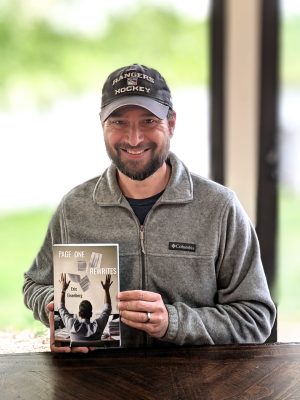Mount Kisco Native Rewrites Life’s Stories with New Book

By Elissa Leka
As a one-year-old, Eric Eisenberg’s daughter had already mastered her first magic trick. One minute, her milk bottle was clutched firmly in her hands, and the next it had vanished without a trace. Then the same thing would happen with her pacifiers.
For most parents, this daily game of hide-and-seek with baby essentials is just the routine reality of parenting a toddler. But for the Mount Kisco native, the experience sparked something different: the inspiration for a book.
One day, after yet another search for the missing items, he turned to his wife with a revelation. “You know,” he said, “every time we give her something, it’s Gone in 60 Seconds.”
This was a fortuitous allusion to the hit action-heist movie from the early 2000s starring Nicolas Cage and Angelina Jolie about a successful car thief in California and his old crew. Despite the movie’s plot being irrelevant to a bottle-losing baby, the title triggered some inspiration for Eisenberg.
That observation would become the foundation for his debut comedy novel, Page One Rewrites, a collection of short stories published last month that transform the mundane into amusing reimaginings of popular Hollywood movies based on their titles.
Page one rewrites refer to something screenwriters do when they don’t like how a script is progressing. They quite literally rewrite their first page, and that can lead to a completely new concept or plot line arising. For Eisenberg, this meant rewriting movies to fit into relatable scenes from his life.
What began as a spur of the moment remark would quickly evolve into something more – a window into the way he sees the world. Whether it’s cracking a backgammon strategy, analyzing sports for The Wall Street Journal, plucking out a song on the guitar, or dreaming up movie inspired satire, Eisenberg has always been in the business of figuring things out.
“When I start writing, I’m one of those people that sit down and will sit there for a long time and write until it’s right,” he explained.
Kisco Kid
From growing up in Mount Kisco and graduating Fox Lane High in 1993, to attending the University of Michigan, trading equity options on the American Stock Exchange floor, and now living with his family in the Chicago suburbs, everything in Eisenberg’s life — including what he might be streaming — became fair game for his novel.
“If I was scrolling for something to watch on Netflix or Amazon or something, I would see a title and be like, oh, I could use that,” Eisenberg noted.
This process became a way for him to reflect on his own life. He’d create a fake movie synopsis using titles that stood out to him as starting points, weaving in real memories that those titles reminded him of.
“The book is meant to feel like readers can relate to much of it… personal stories and fake movies about parenting, growing up, getting old, work, marriage, etc.,” Eisenberg wrote in an email.
For the book, Eisenberg had more than 200 movies at the ready. His biggest challenge was working out how to spread these out equally for each chapter of the book.
“There was a parenting chapter, one on getting old and married, things like that,” he said. “So, I would sort of organize all those movies into those chapters and come up with my personal stories that applied to them. And I found that some of them led to chapters that were very imbalanced.”
To overcome this, he had to reframe his scenes. When he thought one aspect of his life, like parenting, had been given too many scenes, he would rework that chapter, looking at it through the lens of his career or his marriage to even it out. It was as though he were putting together a jigsaw puzzle of his life for the purpose of entertaining an audience who can relate well to his amusing scenes.
Book Life
The other challenge Eisenberg referenced was working with artificial intelligence.
“AI is not as good as people think it is, is what I learned,” he laughed.
To introduce his reimagined ideas, he needed to create eye-catching movie posters. In theory, the quickest way to do that was to generate images with the help of AI, but it turned out to be a long process that kept him from writing.
“It would take me a lot of iterations to get what I wanted,” he said. “And even then, it’s not all perfect. The images to me are the least fun part, I guess, because I just wanted to write.”
Sometimes the best stories are hidden in plain sight, waiting for someone with the right perspective to notice them. Page One Rewrites may be Eisenberg’s debut, but with so much potential material and a lifetime of observations still accumulating, it’s likely just the beginning.
“I wrote this book, and it’s given me sort of a better sense of how to approach another book,” he recounted. “I have a couple of other ideas that I’d like to write…some ideas I have going forward for my next book, and I’m looking forward to it.”
The book is available on Amazon.

Examiner Media – Keeping you informed with professionally-reported local news, features, and sports coverage.
